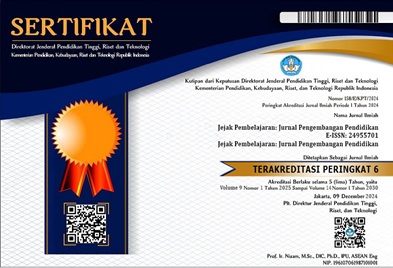PENGARUH KOLABORASI MODEL PEMBELAJARAN PROBLEM BASED LEARNING (PBL) DENGAN ROLE PLAYING TERHADAP HASIL BELAJAR KELAS X MPLB ELEMEN TEKNIK DASAR AKTIVITAS PERKANTORAN DI BIDANG MPLB SMKS PAB 2 HELVETIA T.A 2024/2025
Kata Kunci:
Problem Based Learning, Role Playing, Hasil BelajarAbstrak
The purpose of this study to determine the increase in student learning outcomes at SMKS PAB 2 Helvetia class X MPLB 2025 with the application of the Problem Based Learning (PBL) Learning Model Collaboration with Role Playing. So that it can be an input for Vocational High School Education Institutions to be able to evaluate the application of learning models. This type of research is experimental with the Total Sampling method. The research design used was Nonequivalent Control Group. Data analysis with Shapiro Wilk normality test, homogeneity test, Indepandent sample t test and N-Gain test. Instrument test using validity, reliability, differentiability and difficulty level. Statistical tests showed a significant increase in the experimental class. The average pre-test of the experimental class was 46.67 and increased to 79.56 in the post-test. Meanwhile, the control class also experienced an increase from 49.52 to 67.43. All pre-test and post-test data, both experimental and control classes, were normally distributed (significance value > 0.05) and homogeneous (significance value of homogeneity test 0.092 > 0.05). Hypothesis test results (Sig. (2-tailed) = 0.000 < 0.05) shows that there is a change in the average and an increase in student learning outcomes in the experimental class. Furthermore, the N-Gain test results prove that the experimental class shows sufficient effectiveness with an average N-gain score of 59.9451% (60%), while the control class is not effective with an average N-gain score of 34.2086% (34.2%). It can be concluded that the application of PBL collaboration with role playing can improve student learning outcomes.
Tujuan penelitian ini untuk mengetahui peningkatan hasil belajar siswa di SMKS PAB 2 Helvetia kelas X MPLB 2025 dengan penerapan Kolaborasi Model Pembelajaran Problem Based Learning (PBL) Dengan Role Playing. Sehingga dapat menjadi masukan bagi Lembaga Pendidikan Sekolah Menengah Kejuruan untuk dapat mengevaluasi penerapan model pembelajaran. Jenis penelitian ini adalah eksperimental dengan metode Total Sampling. Desain penelitian yang digunakan Nonequivalent Control Group. Analisis data dengan uji normalitas Shapiro Wilk, uji homogenity, Indepandent sample t test dan uji N-Gain. Uji instrumen menggunakan validitas, reliabilitas, daya beda dan tingkat kesukaran. Uji statistik menunjukkan peningkatan signifikan pada kelas eksperimen. Rata-rata pre-test kelas eksperimen adalah 46,67 dan meningkat menjadi 79,56 pada post-test. Sementara itu, kelas kontrol juga mengalami peningkatan dari 49,52 menjadi 67,43. Seluruh data pre-test dan post-test, baik kelas eksperimen maupun kontrol, berdistribusi normal (nilai signifikansi > 0,05) dan homogen (nilai signifikansi uji homogenitas 0,092 > 0,05). Hasil uji hipotesis (Sig. (2-tailed) = 0,000 < 0,05) menunjukkan bahwa terdapat perubahan rata-rata dan peningkatan hasil belajar siswa pada kelas eksperimen. Lebih lanjut, hasil uji N-Gain membuktikan bahwa kelas eksperimen menunjukkan efektivitas cukup dengan rata-rata N-gain score 59,9451% (60%), sedangkan kelas kontrol tidak efektif dengan rata-rata N-gain score 34,2086% (34,2%). Dapat disimpulkan bahwa penerapan kolaborasi PBL dengan role playing dapat meningkatkan hasil belajar siswa.





